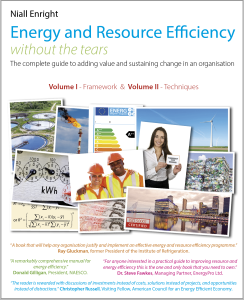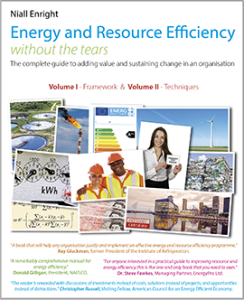Colleagues may be aware that I have spent six years writing two books on energy and resource efficiency. I am pleased to announce the books have now been published.
This can only be described as a “labour of love”, as the economics of publishing non-fiction are horrendous. Indeed, I have decided to make this book available free of charge as a PDF, as a small contribution to helping others create a more sustainable future. You are welcome – encouraged – to share this free PDF with others.
Given the closely linked nature of the content, I have decided to combine the two books into one PDF and print volume. In total there are over:
450,000 words
840 pages
For those are interested in buying a printed copy, you may like to know that it is produced by “print on demand” by Lightning Source, which is a much more environmentally friendly method of publishing, since a book is only printed when an order is received. Should you want the print copy, you can order it via my webstore. I can despatch the book worldwide with a FREE postage option for the UK and much of Europe, and modest costs worldwide. If other sites offer the book (e.g. Amazon, Booktopia , I will provide links here in due course).
The best way to familiarise yourself with the books is to look at the free PDF version. So far, there have been
4759 Downloads |
Here is a summary of the contents:
| Volume I – Framework | Volume II – Techniques |
| 1. Getting Started 2. Contemporary ideas 3. Value 4. Resource efficiency is not easy 5. A Framework 6. Mandate 7. Method 8. Momentum |
9. Creating a Mandate 10. Developing a Strategy 11. Goals 12. Discovery 13. Meters 14. Analysing Data 15. Measuring and Verifying Savings 16. Presenting Data 17. Financial Analysis 18. Funding for Improvement 19. People 20. Driving Improvement 21. ISO 50001:2018 22. Disclosure 23. Systems and Design |
Although the two volumes are quite distinct, they touch on many common subjects. As a result they are both published together, allowing for plentiful cross-references, a common index and bibliography.
The intention is that these books will provide a practical resource for anyone who wants to undertake a resource or energy efficiency program in their organisation. They avoid the self-congratulatory case studies that are out there and recognise the fact that, for many reasons, resource efficiency is hard. These books have little by way of content about technologies, as there are already excellent publications in this field. What they focus on are the financial, organisational, data and people issues that are the real determinants of success or failure.
There is a strong emphasis on signposting sources of further information (for example there are over 800 references provided in the bibliography, most with web links).
I welcome any thoughts and suggestions for improvement – please feel free to contact me directly (my details are in the sidebar).




0 Comments
Trackbacks/Pingbacks